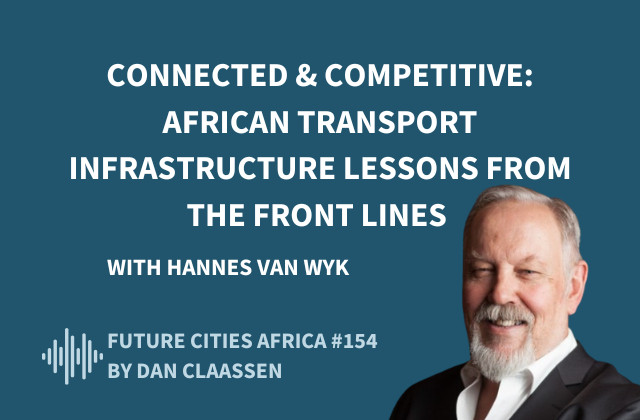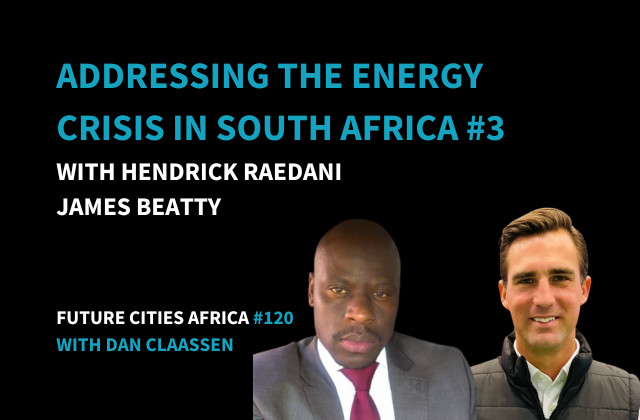Listen to Audio
What Africa’s City Brand and Investment Profiles Tell Us About its Urban Future
Peter Griffiths is a Global Urban Futures Expert who helps people see and imagine cities differently. In this Master Class on city branding we dive into why brand is so critically important and how to leverage it for maximum impact, how brand impacts people's lives, African cities to be treated as peers internationally, and so much more.
Stay Connected
Episode Summary:
- 00:00:00 In this section Peter Griffiths, a Global Urban Futures Expert, discusses the importance of city branding and its impact on a city's urban future. Griffiths, who grew up in South Africa and became interested in cities due to the country's challenges, explains that branding makes it easier for cities to convey messages about themselves and project a positive image, even when facing numerous challenges. He uses examples such as London and Glasgow to illustrate how effective branding can help cities deal with issues in a more progressive way. While cities have numerous problems to solve, Peter argues that a strong brand can create opportunities for cities to address challenges more effectively and shift the narrative away from immediate issues. He also mentions a study he conducted on the impact of digital mentions on cities as brand, which suggests that the number of social media mentions a city receives can influence its brand perception.
- 00:05:00 In this section, Peter discusses a global study on city mentions and their correlation with GDP. The study found that the top 250 cities by mentions and GDP were almost identical, indicating a clear correlation between global perception and investment. He emphasises that a city's relevance, as indicated by the amount of conversation around it, is crucial for attracting investment and sustaining growth. Peter also mentions that short-term campaigns can lead to a boost in a city's digital visibility and global rankings. Ultimately, brand plays a significant role in shaping people's perceptions and motivations, influencing both local pride and external investment.
- 00:10:00 In this section, Peter Griffiths discuss the importance of city branding for South African cities and the recently released city branding toolkit by the South African Cities Network. He applauds the initiative but suggest that the toolkit could go further in recognising the complexity of cities and the need for multiple stories or entry points to connect people to a place. He argues against the idea of a single brand proposition for a city and instead advocate for a range of stories or circumstances that can make a city feel accessible and possible to invest in or visit. Peter also emphasises the role of content as an infrastructure that can help connect people to places.
- 00:15:00 In this section, Peter Griffiths discusses the importance of self-promotion for smaller cities and regions, particularly in the context of connecting to larger entry points or neighboring centers. Peter uses the examples of Paris and London working together to increase attraction and suggests that smaller places should consider their functional boundaries from a promotion perspective and how they are perceived internationally. He also touches on the impact of the pandemic on city branding and staying relevant in the face of competition drawing people out of cities. Despite the challenges, Peter suggests that being globally relevant may not be essential for places doing well and that smaller places may offer better quality of life.
- 00:20:00 In this section, Peter Griffiths discusses the unique opportunity for African cities to rebrand themselves. Cities around the world have had to reboot at the same time, creating a chance for places to own their narrative and rethink their image. He also notes that cities have worked hard over the last few decades to become relevant again in terms of global policy agendas, such as climate change, productivity, innovation, and cultural flows. However, there is a trend of people moving to the countryside, which raises questions about cities' capacity to generate talent and attract skills. Peter suggests looking at the impact of the pandemic on how people arrange themselves and consume, and how this might affect branding and amenities in African cities. He also emphasises the importance of African cities learning from other parts of the world and projecting themselves as solutions to problems.
- 00:25:00 In this section, Peter Griffiths expresses fascination with the livability and problem-solving abilities of African cities like Lagos and Nairobi, despite their challenges. He argues that African cities may have unique solutions to global challenges and encourages them to identify which challenges to own and address. Peter also suggests looking at smaller cities as case studies for rebranding and investment, using examples like Helsinki and Rotterdam. He emphasises the complexity of cities and warns against trusting anyone who claims to have a one-size-fits-all solution. As a practical tip, Peter suggests conducting a Google image search of a city to understand how it is perceived by outsiders and ensuring that the images showcase a diverse range of experiences within the city.
- 00:30:00 In this section, Peter Griffiths discusses the importance of making cities more visible and accessible to the world. He suggests that cities need to consider how they are perceived from the outside and ensure there are diverse entry points for people to learn about them. This can include tagging iconic images in multiple languages and understanding how people access information about the city beyond popular platforms. He also emphasises the need for local knowledge to navigate cities, especially in areas without flagship transport infrastructure or bus networks. He envisions a future where African cities are treated as peers and their assets are used more effectively to tell their own stories and ensure the thriving of their populations. Ultimately, his vision for cities as a whole is that they create spaces where all people can live meaningfully together.
- 00:35:00 In this section, Peter emphasises the importance of moving beyond extracting resources from African cities and towards sharing ideas in a productive and gainful way for the whole world.







